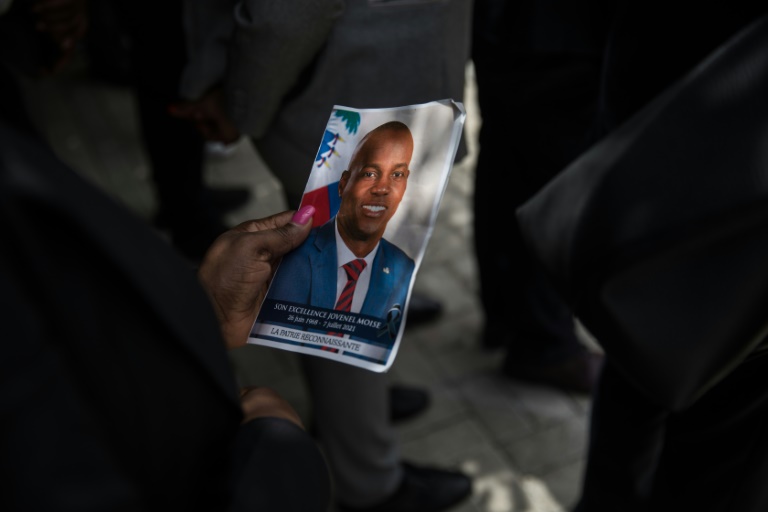Mourners were set to offer their final farewell to Haiti’s slain president under tight security on Friday, just over two weeks after his assassination rattled a country mired in poverty, corruption, and political instability.
Moise, who was 53 when he was shot dead in his home in the early hours of July 7, is set to be interred in Cap-Haitien, the main city in his native northern region.
According to the official program, the funeral is due to begin in the morning and last for several hours, with large screens set up for mourners to follow the event.
Moise’s widow is expected to be joined at the event by the late president’s relatives, cabinet members, and current and former senior government officials, as well as religious figures and representatives of trade unions and civil society groups.
Cap-Haitien was calm Thursday, but a day earlier clashes broke out when police chief Leon Charles visited.
He was booed and heckled while inspecting security arrangements for the funeral.
Local residents blame the police chief for not protecting Moise, whose wife Martine was seriously wounded in the gun attack seemingly carried out by a group of mainly Colombian retired soldiers — with no injuries to the presidential guard.
So far, more than 20 people have been arrested, most of them Colombians, and police say the plot was organized by Haitians with political ambitions and links outside the country.
But the case remains murky, with many unanswered questions.
Haitians have expressed shock that those tasked with protecting the president and his home failed him so abjectly.
The impoverished Caribbean nation is riddled with crime and powerful gangs — problems that were exacerbated during Moise’s presidency.
His death has rekindled long-standing tensions between the north of Haiti and the west, which in part stems from historic racial divisions dating back to French colonialism between northern blacks who are descendants of slaves and lighter-skinned Haitians of mixed race living in the south and west.
Some residents have even set up barricades on roads leading to Cap-Haitien to keep people from the capital Port-au-Prince from attending the funeral.
“We are going to do everything we can to honor him the way he deserves, in line with his importance for our city,” said Cap-Haitien Mayor Yvrose Pierre.
– Praying for justice –
A Catholic mass was held for Moise Thursday at the city’s cathedral, followed by a procession in his honor.
“His assassination saddened me very much.
I prayed for his soul. I prayed that justice will be rendered,” said a woman standing near the cathedral, who only gave her first name Carine.
Memorial ceremonies in honor of Moise have been held this week in Port-au-Prince as well.
Attending one of them was new Prime Minister Ariel Henry, who was sworn in Tuesday and vowed to restore order and organize long-delayed elections as sought both by Haitians and the international community.
The US State Department on Thursday named a new special envoy to Haiti tasked with helping to usher along the organization of elections.
Haiti currently has no working parliament and only a handful of elected senators.
The interim government installed this week has no president.
US Secretary of State Antony Blinken called Henry on Thursday to express Washington’s “commitment to supporting the Haitian people following the heinous assassination” of Moise.
Blinken also “emphasized the importance of establishing the conditions necessary for Haitians to vote in free and fair legislative and presidential elections as soon as feasible.”
Washington earlier said those elections should be held later this year.
France on Thursday called for legislative and presidential elections to be held “as soon as conditions allow it.”
Moise had ruled Haiti, the poorest country in the Americas, by decree after legislative elections due in 2018 were delayed in following multiple disputes.
As well as presidential, legislative and local elections, Haiti had been due to have a constitutional referendum in September after it was twice postponed due to the coronavirus pandemic.











